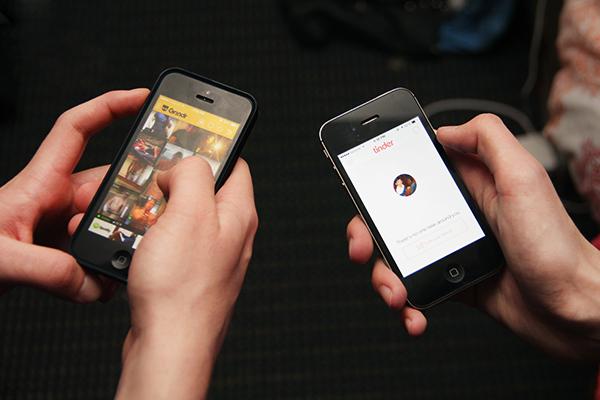
Sierra Schwartz first downloaded Tinder last month for the same reason all of her friends did: It would be funny to pull out her phone at a party to rate guys nearby.
Soon after, the junior took a chance and began going out on her first “Tinder dates.” The iPhone app created plenty of bizarre moments – including a date with a guy who confessed to seeing demons.
Even after a handful of odd encounters and creepy messages, Schwartz hasn’t been turned off from Tinder. She said she sees the online dating apps as a legitimate way to meet people, even if just for a hookup.
“I don’t think anyone wants to admit to it, it’s almost a taboo like, ‘Oh you met this guy on an iPhone app?’” Schwartz said. “College kids want to meet people and hook up with them, so I think it’s why they use it so much.”
Now, there’s a more efficient dating system across college campuses: Look through your selection of potential matches and “swipe” past those you don’t find attractive. Though Tinder launched two years ago and Grindr, an app for gay and bisexual men, started in 2009, the apps’ popularities have only recently cascaded across campus.
Tinder’s founders put their faith in college students to grow their user bases, relying on places like their alma mater, University of Southern California. Though its average user hovers around the age of 27, the company cites college students as a large portion of their users.
Many students said their initial uses of online matchmaking apps were out of curiosity. But as time went by, they started to actually follow through and meet up with their matches. “Tinder dates” have become more than just code for “online hookups.”
Ten students interviewed say their experiences have ranged from seamless encounters to uncomfortable meetups.
Cailey Indech, a senior biology major, said she thinks Tinder is different than other dating sites like OkCupid or Match.com because of its simplicity and focus on physical appearance – not long-term relationships.
“I think some people are hesitant to use OkCupid or other sites that may make it seem like they are looking for a real relationship,” Indech said. “These people resort to Tinder because it is an easier, more casual way of meeting people.”
Senior Chris Lewis said Grindr, often maligned as an underbelly of gay culture where nude photos get sent around more than phone numbers, has finally become mainstream. He said instead of spending nights fumbling through flirtation at bars, Grindr helps “cut through all the bullshit.”
“It used to be like every gay guy’s dirty little secret,” Lewis said. “It’s kind of funny – everyone has a smart phone now, so it’s kind of like most people are open about it.”
Though the apps are mostly geared toward casual sexual encounters, increasing the odds of snagging a hookup isn’t always positive, said Kimberly Acquaviva, an associate dean in the nursing school with a doctorate degree in human sexuality education.
She said that apps like Tinder and Grindr can make sex feel “more like something you get quick-shipped to you from Amazon.com.”
“The search for string-free hookups isn’t something new. And the almost-inevitable dissatisfaction that results from searching for commitment-free, emotion-free, attachment-free hookups isn’t new, either,” Acquaviva said.






